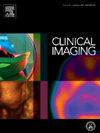Patient perspectives on AI in radiology: Insights from the United Arab Emirates
IF 1.5
4区 医学
Q3 RADIOLOGY, NUCLEAR MEDICINE & MEDICAL IMAGING
引用次数: 0
Abstract
Rationale and objectives
Artificial intelligence (AI) enhances diagnostic accuracy, efficiency, and patient outcomes in radiology. Patient acceptance is essential for successful integration. This study examines patient perspectives on AI in radiology within the UAE, focusing on their knowledge, attitudes, and perceived barriers. Understanding these factors can address concerns, improve trust, and guide patient-centered AI implementation. The findings aim to support effective AI adoption in healthcare.
Methods
A cross-sectional study involving 205 participants undergoing radiological imaging in the UAE. Data was collected through an online questionnaire, developed based on a literature review, and pre-tested for reliability and validity. Non-probability sampling methods, including convenience and snowball sampling, were employed. The questionnaire assessed participants' knowledge, attitudes, and perceived barriers regarding AI in radiology. Data was analyzed, and categorical variables were expressed as frequencies and percentages.
Results
Most participants (89.8 %) believed AI could improve diagnostic accuracy, and 87.8 % acknowledged its role in prioritizing urgent cases. However, only 22 % had direct experience with AI in radiology. While 81 % expressed comfort with AI-based technology, concerns about data security (80.5 %), lack of empathy in AI systems (82.9 %), and insufficient information about AI (85.8 %) were significant barriers. Additionally, (87.3 %) of participants were concerned about the cost of AI implementation. Despite these concerns, 86.3 % believed AI could improve the quality of radiological services, and 83.9 % were satisfied with its potential applications.
Conclusion
UAE patients generally support AI in radiology, recognizing its potential for improved diagnostic accuracy. However, concerns about data security, empathy, and understanding of AI technologies necessitate improved patient education, transparent communication, and regulatory frameworks to foster trust and acceptance.
患者对放射学中人工智能的看法:来自阿拉伯联合酋长国的见解
原理和目的人工智能(AI)提高了放射学诊断的准确性、效率和患者预后。患者的接受是成功整合的关键。本研究考察了阿联酋患者对放射学中人工智能的看法,重点关注他们的知识、态度和感知障碍。了解这些因素可以解决问题,提高信任,并指导以患者为中心的人工智能实施。研究结果旨在支持医疗保健领域有效采用人工智能。方法在阿联酋接受放射成像的205名参与者进行横断面研究。数据是通过在线问卷收集的,该问卷是在文献综述的基础上开发的,并预先测试了信度和效度。采用便利抽样和滚雪球抽样等非概率抽样方法。问卷评估了参与者对放射学中人工智能的知识、态度和感知障碍。对数据进行分析,分类变量用频率和百分比表示。结果大多数参与者(89.8%)认为人工智能可以提高诊断准确性,87.8%的人承认人工智能在优先处理紧急病例方面的作用。然而,只有22%的人在放射学中有人工智能的直接经验。尽管81%的受访者表示对基于人工智能的技术感到满意,但对数据安全的担忧(80.5%)、对人工智能系统缺乏同理心(82.9%)以及对人工智能的信息不足(85.8%)是主要障碍。此外,(87.3%)的参与者担心人工智能实施的成本。尽管存在这些担忧,86.3%的人认为人工智能可以提高放射服务的质量,83.9%的人对其潜在的应用感到满意。结论阿联酋患者普遍支持人工智能在放射学中的应用,认识到人工智能在提高诊断准确性方面的潜力。然而,对数据安全、同理心和对人工智能技术的理解的担忧需要改进患者教育、透明沟通和监管框架,以促进信任和接受。
本文章由计算机程序翻译,如有差异,请以英文原文为准。
求助全文
约1分钟内获得全文
求助全文
来源期刊

Clinical Imaging
医学-核医学
CiteScore
4.60
自引率
0.00%
发文量
265
审稿时长
35 days
期刊介绍:
The mission of Clinical Imaging is to publish, in a timely manner, the very best radiology research from the United States and around the world with special attention to the impact of medical imaging on patient care. The journal''s publications cover all imaging modalities, radiology issues related to patients, policy and practice improvements, and clinically-oriented imaging physics and informatics. The journal is a valuable resource for practicing radiologists, radiologists-in-training and other clinicians with an interest in imaging. Papers are carefully peer-reviewed and selected by our experienced subject editors who are leading experts spanning the range of imaging sub-specialties, which include:
-Body Imaging-
Breast Imaging-
Cardiothoracic Imaging-
Imaging Physics and Informatics-
Molecular Imaging and Nuclear Medicine-
Musculoskeletal and Emergency Imaging-
Neuroradiology-
Practice, Policy & Education-
Pediatric Imaging-
Vascular and Interventional Radiology
 求助内容:
求助内容: 应助结果提醒方式:
应助结果提醒方式:


